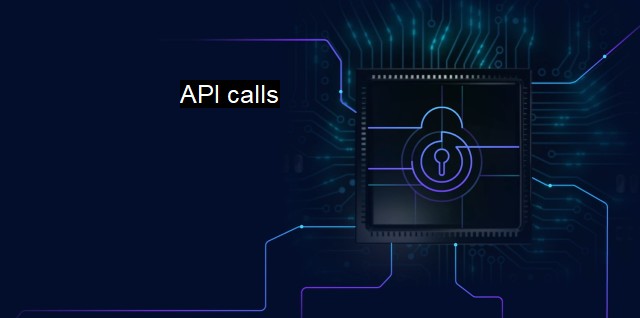What are API calls?
API Calls and Cybersecurity: Mitigating Risks and Enhancing Protection for Modern Business Operations
API stands for Application Programming Interface, and it refers to the many protocols that allow various software applications to share their functionalities, thus enabling effective communication between them. An API call is the process in which these programs contact and communicate with each other. In the realm of cybersecurity and antivirus applications, API calls play a pervasive and pivotal role.The procedure of communicating through API calls involves the exchange of data between the software applications. It is equivalent to dialing a number or pressing 'call' on a smartphone's touchscreen. The call connects the smartphone to the other device via cell towers and satellites enabling voice and data transmission. This cluster of information shared is, hence, the API call.
API calls present within antivirus software facilitate virtually all functions, including scanning files, checking the safety status of URLs, updating the virus dictionary, and real-time protection.
While the ability of applications to share information using APIs creates seamless integration and enhanced utility for users, it can also pose certain information security risks – if leveraged with ill-intent. API calls can be intercepted, manipulated, or faked, providing a sizable threat source that malevolent actors often exploit to carry out attacks.
This presents an unignorable liability for cybersecurity companies that often manage data security for businesses worldwide. Companies have to be cognizant of protecting their data at each level - even API calls. There is an ongoing evolution when it comes to securing the communication process, from encryption algorithms to comprehensive API management tools, to ensure that only permitted and secure API calls occur.
Antivirus solutions often include making API calls to the cloud to check against newly developed threats. Threat data is collected over a network of millions of users and culminated in the company's cloud storage. When an incoming threat resides within a user's device, the antivirus will make an API call to the cloud. The threat is analyzed by checking against the existing database.
API calls have a profound impact on antivirus effectiveness. Upon receiving abnormal API calls, alarms are set off, prompting the antivirus software to analyze the requested API call and check against the register of known threats.
Some modern antivirus software will not merely block questionable API calls but go a step further to observe the software or script attempting this call. The behavior of the software helps the antivirus understand if the intentions are untrusting or deserving of outright blocks.
This way, antivirus solutions are consistently evolving their heuristic capabilities, which allow them to recognize not just existing malware threats, but also early warning signals that suggest previously unknown or very new threats exploiting vulnerabilities in the most recent or yet-to-exhibit APIs.
Despite this, attackers often target these security solutions' complex mechanisms. Malware can camouflage themselves, rendering their API calls virtually undetectable, tricking even some sophisticated modern antivirus software. Hence, antivirus solutions need to update continually and make beneficial use of API calls to improvise their responses, currently with behavioral patterns and zero trust protocols, which block any potentially compromising API calls.
The security architecture embedded within anti-virus software far extends beyond merely cleaning various threats from your environment. It has a vested focus on protecting the integrity of API calls, allowing for smooth and secure cooperation between programs in this vast meta-universe of tech advancements. Securing these API calls is a non-negotiable element of sturdy cybersecurity and fostering a sound safety framework amidst a threatening cyber environment, demonstrating the immense value, often overlooked, of the simple API calls.

API calls FAQs
What is an API call in cybersecurity and antivirus?
In cybersecurity and antivirus, an API call refers to the process by which an application or program requests access to the features or functionality of another program or service through a defined set of protocols or interfaces. This can include requests for virus scans, threat analysis, or other security-related tasks.How are API calls used in cybersecurity and antivirus?
API calls are widely used in cybersecurity and antivirus applications for a variety of tasks, including malware analysis, threat detection, and remediation. They allow applications and services to communicate with one another, enabling the sharing of data and resources to help protect against threats and vulnerabilities.What are some common cybersecurity and antivirus APIs?
There are a variety of APIs used in cybersecurity and antivirus applications, including virus scanning APIs, threat analysis APIs, quarantine and remediation APIs, and more. Some popular examples include the VirusTotal API, the ThreatConnect API, and the Metasploit API.How do API calls impact cybersecurity and antivirus performance?
API calls can have a significant impact on cybersecurity and antivirus performance, as they can add additional overhead and latency to the system. However, they also enable more effective and efficient threat detection and remediation, so it's important to balance the benefits of API calls with their potential impact on performance. Optimizing API usage and minimizing unnecessary calls can help minimize performance impacts.| | A | | | B | | | C | | | D | | | E | | | F | | | G | | | H | | | I | | | J | | | K | | | L | | | M | |
| | N | | | O | | | P | | | Q | | | R | | | S | | | T | | | U | | | V | | | W | | | X | | | Y | | | Z | |
| | 1 | | | 2 | | | 3 | | | 4 | | | 7 | | | 8 | | |||||||